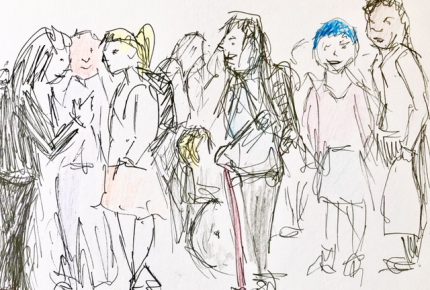16-19 years old and in School or Further Education (FE) College
Educational Maintenance Allowance (EMA)
If you are staying on at school after your school leaving date – the earliest date you can leave school – then you may be entitled to claim an Educational Maintenance Allowance (EMA).
To be eligible you must be between the ages of 16 and 19, ordinarily resident in Scotland, have a household income below a certain level and be in school full-time or in a non-advanced college course.
You can find out more about the EMA and how to apply here:
https://www.mygov.scot/ema/can-i-get-ema/
Other funding
If you have a disability which significantly affects your ability to perform tasks required in caring for yourself or that affects your mobility then from age 16 you may be eligible to apply for Adult Disability Payment (ADP). Should you be awarded it then this payment is not calculated as income and will not affect anything else you may be entitled to.
Help or reasonable adjustments
It may be that you need a bit of extra help or equipment to support you in your education due to your disability or impairment. Should this be the case you would discuss it with your school or college and they would be responsible for the costs of any of this support.
A good source of information on getting the support you (or if you are a parent – your child) need at school can be found here:
Further Education (FE) Colleges
The previous section deals with funding for 16-19 year olds in both school and in an FE College. There is an excellent resource on on the Student Information Scotland website which covers funding college courses.
Higher Education (HE)
Funding University Fees
Students ordinarily resident in Scotland on an undergraduate degree course of study are funded by the Student Awards Agency Scotland (SAAS). You should have been resident for three years prior to the start of your course. This funding covers the fees for an undergraduate degree, an HNC/HND. You can find all the eligibility details for SAAS funding here:
https://www.saas.gov.uk/full-time/funding-information-undergraduate
If you do not fulfil the residency criteria for SAAS funding but have been resident in the UK then do check the other UK funding bodies.
Student Finance Northern Ireland
Living expenses
UK students on recognised courses can apply for loans to help with living expense while studying. Scottish students would apply through SAAS. The Student Loans Company pays the loan but you can check the progress you application in your SAAS account.
You can find some information on it here on the UK Government website:
https://www.gov.uk/guidance/guidance-for-students-from-scotland
Benefits
Most full-time students are not eligible for means tested benefits but there are some exceptions. You can find some information on it here:
Part-time students may have some benefit entitlement and you can learn about that here:
Disabled Student’s Allowance (DSA)
Disabled Student’s Allowance (DSA) deserves a section on its own since some students in Further Education and some in Higher Education can apply for it.
Disabled Student's Allowance and Reasonable Adjustments
Reasonable Adjustments
The term ‘reasonable adjustments’ comes from The Equality Act (2010). What it means for disabled students is that educational institutions should assess any barriers to their education arising out of their disability and make reasonable adjustments to help ensure they are not disadvantaged in comparison to non-disabled peers. What is ‘reasonable’ is determined by a number of factors including for example, the resources of the institution and also the assessment criteria and specific course requirements. Adjustments may range from small tweaks to organisation of teaching and learning, to equipment or even structural adaptations to buildings such as fitting ramps.
Costs of adjustments may be met by the institution for students who are not eligible for Disabled Student’s Allowance (DSA) or by DSA for students who are eligible.
Disabled Student’s Allowance (DSA)
DSA is paid to cover the costs of some of the recommendations which may be made as reasonable adjustments. This could include equipment or specialist tutors or mentors. The process for claiming DSA varies a little depending on who your funding body is but your college or university will usually be able to give you the information you need.
You can find out more about who is eligible for DSA here:
https://www.saas.gov.uk/guides/disabled-students-allowance
The recommendations for reasonable adjustments will be made by a qualified needs assessor in your university or in an assessment centre. Your assessor writes a needs assessment report which will be sent with your application for DSA to your funding body who use it to decide what to award you.
If you want to understand a bit more about applying for Disabled Students Allowance and what the Needs Assessment process is like then go to these sections in the Disabled Students in Further and Higher Education Guide:
What if the funding body rejects some or all of the recommendations?
Information last updated on 13 August 2024. Please note that information may be subject to change. All information is provided in good faith but Disability Information Scotland does not endorse any product or service referred to within this resource.
If you would like this information guide in another version then please contact us and we will post or email you a copy.
Education, Training and Employment:Search for Local Organisations
Our quick search tool can connect you to over 3000 service providers, suppliers and organisations supporting people across Scotland. To find support near you, simply enter your search term and select your local authority.
| Organisation | Description |
|---|---|
| Aberdeen Citizens Advice Bureau | Provide information to people living in the local area |
| AbilityNet | Works with people with all disabilities and of all ages, helping them to use computers and the internet to improve their lives at home, at work and in education |
| ACAS (Scotland) | Impartial advice and information on employment relationships |
| ACOSVO | ACOSVO is a growing membership organisation of over 750 voluntary sector Chief Executives, senior leaders, Chairs and Vice Chairs across Scotland, all committed to the vision of: ‘Excellent Voluntary Sector Leadership in Scotland.’ Our members range fr… |
| Action Group | Offer a range of services to people with learning difficulties |
| Adapt-IT | Description of service: Adapt-IT are suppliers of assistive technology, including, specialist computer equipment, software, and services. Do you have difficulties using your computer because of a physical or neurological condition? We can help you find… |
| Additional Support Needs Tribunals for Scotland (ASNTS) | Tribunal service which will hear cases brought by parents and young people concerning provision made for children and young people facing the biggest barriers to learning |
| Advertising Standards Authority | Maintaining the highest standards of all non-broadcast and broadcast advertisements |
| Age UK (England) | National body of Age Concern groups providing services to older people |
| Airdrie Citizens Advice Bureau | Aims: To ensure that individuals do not suffer through lack of knowledge of their rights and responsibilities, or of the services available to them, or through an inability to express their need effectively and, equally to exercise a responsible influe… |
- 1
- 2
- 3
- ...
- 21
- Next Page »

